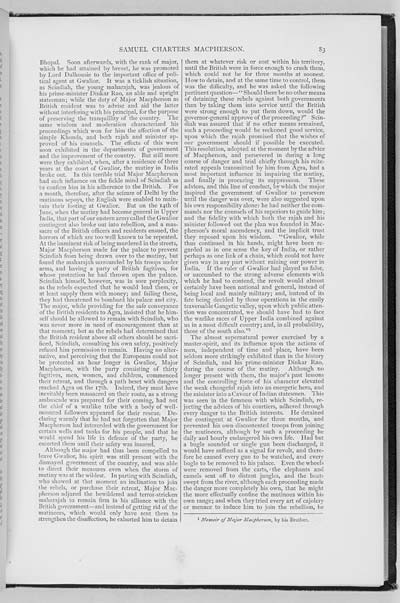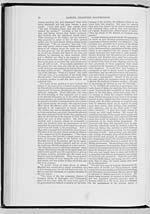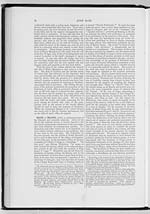S3
Bhopal. Soon afterwards, with the rank of major,
which he had attained by brevet, he was promoted
by Lord Dalhousie to the important office of poli-
tical agent at Gwalior. It was a ticklish situation,
as Scindiah, the young maharajah, was jealous of
his prime-minister Dinkar Rao, an able and upright
statesman; while the duty of Major Macpherson as
British resident was to advise and aid the latter
without interfering with his principal, for the purpose
of preserving the tranquillity of the country. The
same wisdom and moderation characterized his
proceedings which won for him the affection of the
simple Khonds, and both rajah and minister ap-
proved of his counsels. The effects of this were
soon exhibited in the departments of government
and the improvement of the country. But still more
were they exhibited, when, after a residence of three
years at the court of Gwalior, the mutiny in India
broke out. In this terrible trial Major Macpherson
had such influence on the fickle mind of Scindiah as
to confirm him in his adherence to the British. For
a month, therefore, after the seizure of Delhi by the
mutinous sepoys, the English were enabled to main-
tain their footing at Gwalior. But on the I4th of
June, when the mutiny had become general in Upper
India, that part of our eastern army called the Gwalior
contingent also broke out into rebellion, and a mas-
sacre of the British officers and residents ensued, the
horrors of which are too well known to be repeated.
At the imminent risk of being murdered in the streets,
Major Macpherson made for the palace to prevent
Scindiah from being drawn over to the mutiny, but
found the maharajah surrounded by his troops under
arms, and having a party of British fugitives, for
whose protection he had thrown open the palace.
Scindiah himself, however, was in sore perplexity,
as the rebels expected that he would lead them, or
at least supply them with money; and failing these,
they had threatened to bombard his palace and city.
The major, while providing for the safe conveyance
of the British residents to Agra, insisted that he him-
self should be allowed to remain with Scindiah, who
was never more in need of encouragement than at
that moment; but as the rebels had determined that
the British resident above all others should be sacri-
ficed, Scindiah, consulting his own safely, positively
refused him permission to remain. Having no alter-
native, and perceiving that the Europeans could not
be protected an hour longer in Gwalior, Major
Macpherson, with the party consisting of thirty
fugitives, men, women, and children, commenced
their retreat, and through a path beset with dangers
reached Agra on the 17th. Indeed, they must have
inevitably been massacred on their route, as a strong
ambuscade was prepared for their coming, had not
the chief of a warlike tribe with a body of well-
mounted followers appeared for their rescue. De-
claring warmly that he had not forgotten that Major
Macpherson had interceded with the government for
certain wells and tanks for his people, and that he
would spend his life in defence of the party, he
escorted them until their safety was insured.
Although the major had thus been compelled to
leave Gwalior, his spirit was still present with the
dismayed government of the country, and was able
to direct their measures even when the storm of
mutiny was at the wildest. In parting with Scindiah,
who showed at that moment an inclination to join
the rebels, or purchase their retreat, Major Mac-
pherson adjured the bewildered and terror-stricken
maharajah to remain firm in his alliance with the
British government�and instead of getting rid of the
mutineers, which would only have sent them to
strengthen the disaffection, he exhorted him to detain
them at whatever risk or cost within his territory,
until the British were in force enough to crush them,
which could not be for three months at soonest.
How to detain, and at the same time to control, them
was the difficulty, and he was asked the following
pertinent question�'' Should there be no other means
of detaining these rebels against both governments
than by taking them into service until the British
were strong enough to put them down, would the
governor-general approve of the proceeding?" Scin-
diah was assured that if no other means remained,
such a proceeding would be reckoned good service,
upon which the rajah promised that the wishes of
our government should if possible be executed.
This resolution, adopted at the moment by the advice
of Macpherson, and persevered in during a long
course of danger and trial chiefly through his reite-
rated appeals transmitted by him from Agra, had a
most important influence in impairing the mutiny,
and finally in procuring its suppression. These
advices, and this line of conduct, by which the major
inspired the government of Gwalior to persevere
until the danger was over, were also suggested upon
his own responsibility alone: he had neither the com-
mands nor the counsels of his superiors to guide him;
and the fidelity with which both the rajah and his
minister followed out the plan was founded in Mac-
pherson's moral ascendency, and the implicit trust
they reposed upon his wisdom. "Gwalior, while
thus continued in his hands, might have been re-
garded as in one sense the key of India, or rather
perhaps as one link of a chain, which could not have
given way in any part without ruining our power in
India. If the ruler of Gwalior had played us false,
or succumbed to the strong adverse elements with
which he had to contend, the revolt would almost
certainly have been national and general, instead of
being local and mainly military; and, instead of its
fate being decided by those operations in the easily
traversable Gangetic valley, upon which public atten-
tion was concentrated, we should have had to face
the warlike races of Upper India combined against
us in a most difficult country; and, in all probability,
those of the south also."1
The almost supernatural power exercised by a
master-spirit, and its influence upon the actions of
men, independent of time and place, have been
seldom more strikingly exhibited than in the history
of Scindiah, and his prime-minister Dinkar Rao,
during the course of the mutiny. Although no
longer present with them, the major's past lessons
and the controlling force of his character elevated
the weak changeful rajah into an energetic hero, and
the minister into aCavour of Indian statesmen. This
was seen in the firmness with which Scindiah, re-
jecting the advices of his courtiers, adhered through
every danger to the British interests. He detained
the contingent at Gwalior for three months, and
prevented his own discontented troops from joining
the mutineers, although by such a proceeding he
daily and hourly endangered his own life. Had but
a bugle sounded or single gun been discharged, it
would have sufficed as a signal for revolt, and there-
fore he caused every gun to be watched, and every
bugle to be removed to his palace. Even the wheels
were removed from the carts, the elephants and
camels sent off to distant jungles, and the boats
swept from the river, although each proceeding made
the danger more completely his own, that he might
the more effectually confine the mutinous within his
own range; and when they tried every art of cajolery
or menace to induce him to join the rebellion, he
1 Memoir of Major Macpherson, by his Brother.

![]() Universal Viewer |
Universal Viewer | ![]() Mirador |
Large image | Transcription
Mirador |
Large image | Transcription
![]()

